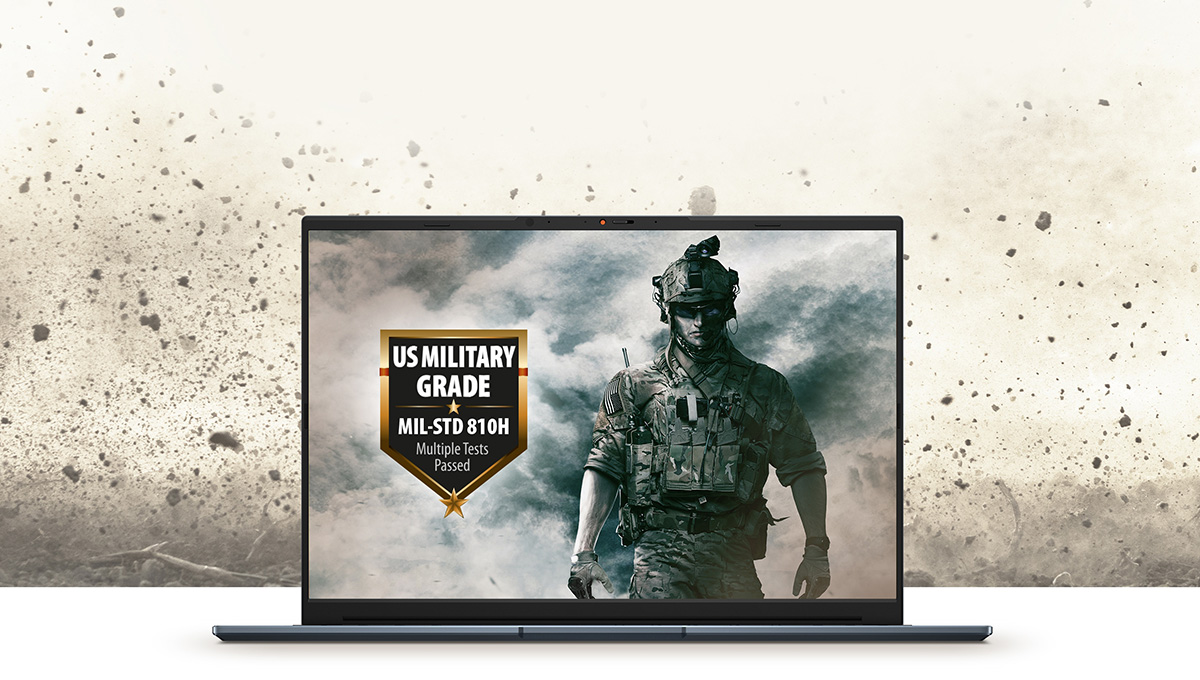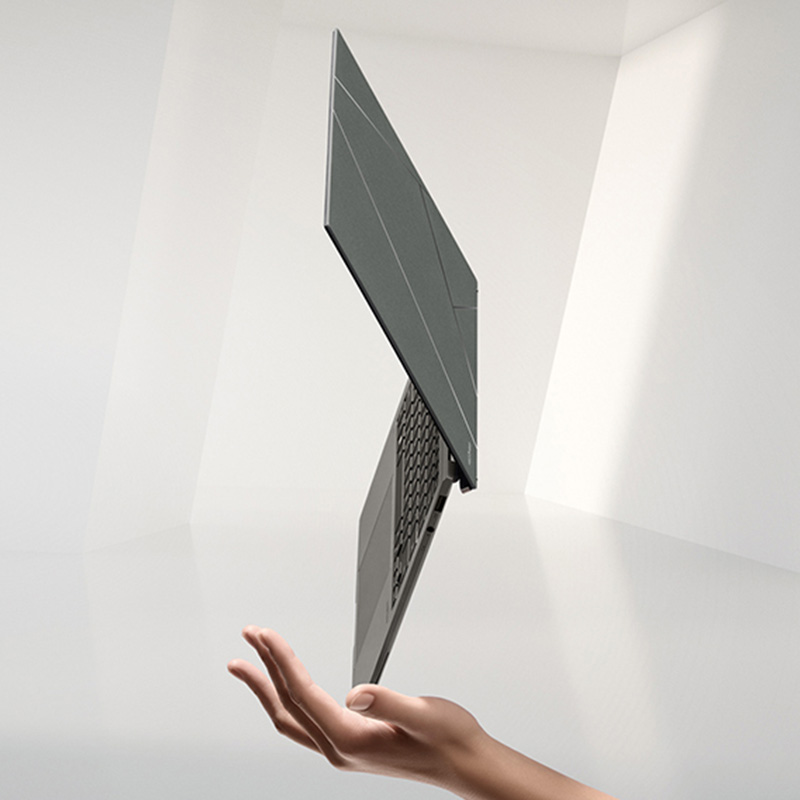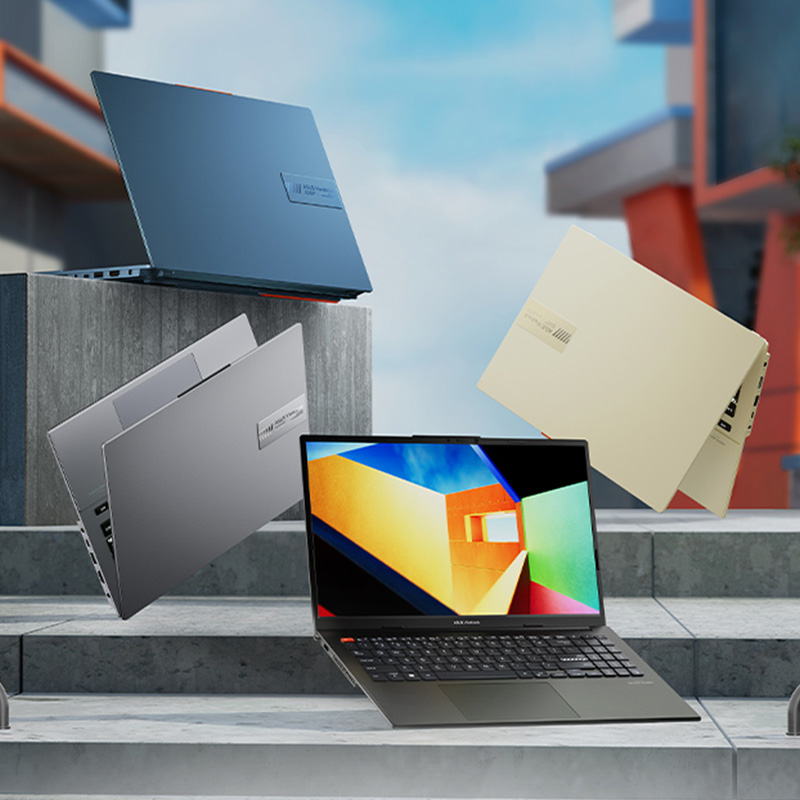
Jun 29, 2023
ASUS's commitment to making the most durable and reliable laptops
has been well-known and proven for decades now. For example, in
1998, an ASUS P6300 laptop traveled to the Mir space station,
accompanying cosmonauts on their 600-days-long mission. The laptop
more than proved its toughness, surviving the entire time without
any trouble.
Since then, ASUS laptops have gone through many more extreme
real-life tests of their durability. They accompanied aerial medical
teams in Australia, off-road racers during the PATAGONIA 2000 race,
and mountaineering teams on expeditions to Mount Everest, as well as
to the North and South Poles.
Time and time again, ASUS has proven users can trust the durability
of our laptops. And, starting from 2023, our laptops will be the
world’s most strictly tested, adhering to US military-grade
standards to give you assurance of their top-notch toughness and
reliability.
What is the US Military Grade MIL-STD 810H Durability Standard?
The MIL-STD was first introduced in the 1950s as a testing standard
for military equipment. Its aim was to examine how rugged and
durable the US army’s equipment was, as well as its ability to
withstand the extreme and everyday conditions it may face throughout
its lifetime. These could include stress factors like environmental
conditions, shock, vibration, altitude, extreme temperatures, or
ability to perform well in dusty or sandy environments.
Over time, the same strict standards were also applied to the
testing of other products, including common electronics, such as
laptops and wearable devices.
MIL-STD 810H is the latest version of the US military grade
durability testing standard.
ASUS has a history of delivering tough, durable devices. And now, we
have decided to formalize our top-notch standards for durability and
test our devices to US military standards. The 2023 ASUS laptops are
the first batch to be strictly tested following the MIL-STD 810H
standard. This means that the laptops you purchase go through 12
methods of tests, undergoing 26 different test procedures, all to
ensure you get a tough, reliable machine that will serve you for
years.
How are ASUS laptops tested for durability?
Below, you can read about the 12 test methods, along with their
procedures, that ASUS laptops go through to ensure their top-notch
durability.
Please keep in mind that while many of these tests simulate extreme
conditions, it is still necessary to follow common laptop safety
practices, such as keeping it dry, storing it at room temperature,
only using it according to its purpose, and protecting it during
transportation.
Shock Test
Shock tests assure resilience to sudden, strong stimuli and mimic
everyday situations where your laptop may face mechanical damage.
The tests include:
- Functional shock
- Transportation shock – on road
- Fragility
- Crash hazard shock
- Bench handling
Vibration Test
Vibration tests check your laptop's resilience to various scales of
vibration for extended periods. This helps assure your ASUS laptop
is well-prepared for everyday commutes and transportation via any
type of vehicle. These tests include:
- Two-wheeled trailer
- Wheeled vehicle
- Common carrier
High-Temperature Test
High-temperature tests examine the laptop's resilience to heat, both
when turned on or stored with the power off. This is especially
relevant to those living in warm climates or working in hot,
industrial environments. These tests include:
- Basic hot storage and transit
- Basic hot operational
- Hot dry storage and transit
- Hot dry operational
Low-Temperature Test
The low-temperature tests help ensure that the laptops work well,
and can be stored safely, in cold environments. These tests are a
great indicator for those living in cold countries or working in
environments with low temperatures, such as refrigerated storage
rooms. These tests include:
- Basic climatic storage and transit
- Basic climatic operational
- Cold climatic storage and transit
- Cold climatic operational
Sand and Dust Test
The sand and dust tests examine the laptops’ ability to perform well
in dusty or sandy environments, where large amounts of small
particles are around the laptop. These tests help ensure you can use
or store your laptop safely in dusty environments like manufacturing
spaces or sandy places, such as the beach. These tests include:
- Blowing Dust
- Blowing Sand
Altitude Test
Altitude tests examine whether it's safe to use and store the laptop
at high altitudes, which can cause some laptops to work differently.
For example, as you go higher, the air density and pressure change,
potentially affecting many aspects of a laptop’s operations, such as
heat dissipation. This is important for those living and working in
high-altitude environments. These tests include:
- Altitude storage
- Altitude operation
Freeze and Thaw Test
The freeze and thaw test ensures that the laptops perform well and
can be stored safely in humid environments where the temperature
swings between -10°C and 30°C, causing the water in the air or
around the laptop to continuously freeze and become liquid again.
This is important for those living and working in cold, humid
environments.
Humidity test
The humidity test examines the laptops' resilience to the water in
the air. Tested at an almost fully saturated humidity level of 95%,
it ensures that those living in more humid atmospheres or working in
spaces with that level of humidity can store the laptops safely for
a long time.
Temperature shock
The temperature shock test helps ensure the laptops can survive the
sudden, violent changes of atmospheric temperature. The laptops go
through multiple cycles of temperature quickly switching between
-51°C and 71°C. This test helps make sure this is a good laptop for
those who frequently and suddenly need to switch between
environments with large temperature differences.
Solar Radiation Test
The solar radiation test examines the laptop’s resilience to sun
rays. This helps ensure that, when you leave your laptop in the
sunlight, it's not going to be affected. This is important for those
who often use the laptop outdoors or whose workspace is near a
window.
Mechanical Vibration Test
The mechanical vibration test helps ensure that the laptop can
continue working correctly even when placed on a vibrating surface.
Their resistance is tested to up to 33 Hz vibration to simulate very
fast-shaking environments. This is great for those who use their
laptops in vibrating settings like industrial spaces.
Explosive Atmosphere Test
The explosive atmosphere test examines the laptop's ability to
perform well in air that is 95% saturated with n-Hexane, a
highly-flammable derivative of crude. Incredibly, ASUS laptops are
still able to be operated safely in these dangerous environments.
This is great for those who use their laptops in an industrial
setting or near gasoline-powered machinery.
Why do you need a laptop tested to US Military-Grade standards?
To put it simply, getting a durable laptop helps ensure that you can
use it for longer. This means that you will not only save money, you
will also help protect the environment.
What's more, your peace of mind is priceless. After all, you're
likely busy with everything else, and constantly worrying about your
laptop is the last thing you want to occupy your mind.
By getting a laptop that’s been torture-tested for durability
against both extreme and everyday conditions, you can you will gain
a companion that you can bring with you anywhere you go – and anyway
you choose to get there!
If you want to learn more about the MIL-STD 810H US military grade
laptop durability testing at ASUS, make sure to click the button
below!
Learn about ASUS Military Grade Laptop Durability Testing












